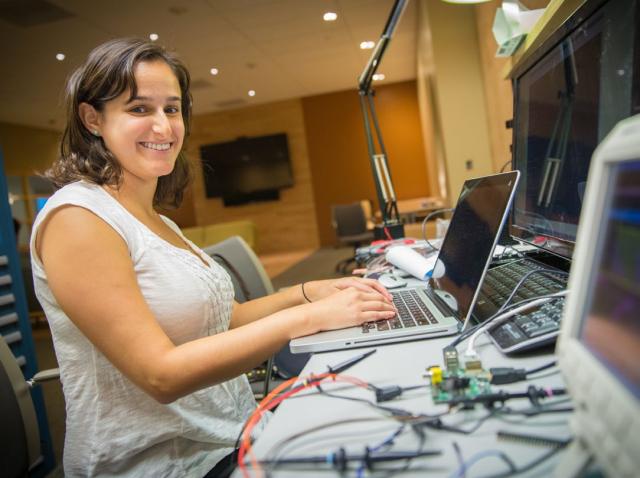
CSE alumna Sarah Meiklejohn received her Ph.D. in computer science in 2014, and soon after accepted a faculty position at University College London in the UK, where she is a lecturer and assistant professor in the computer science as well as security-and-crime departments. For a researcher with broad interests in security and cryptography, being in London also offered the opportunity to continue her research on the international stage that she began at UC San Diego under CSE professors Mihir Bellare and Stefan Savage.
 Now comes word that Meiklejohn (at left) has been singled out for her dissertation, "Flexible Models for Secure Systems", as the recipient of the 2015 Chancellor's Dissertation Medal. As Bellare noted in recommending Meiklejohn for the medal, the results of her thesis "have shaped government policy", with the methods she proposed being used to track real-world cyber criminals. Regarding intellectual and technical depth, "the thesis introduces an innovative new experimental technique to track Bitcoins that was used not only to obtain the thesis results, but is now used as a key forensic tool by law enforcement," said Bellare, who also noted that Meiklejohn did it all herself: "She alone conceived the idea and methods and pushed it through from algorithms to reality. In my 20 years of experience at UCSD, I would say that a thesis with one of the above elements is rare. To have all three in the same thesis is unique and extraordinary."
Now comes word that Meiklejohn (at left) has been singled out for her dissertation, "Flexible Models for Secure Systems", as the recipient of the 2015 Chancellor's Dissertation Medal. As Bellare noted in recommending Meiklejohn for the medal, the results of her thesis "have shaped government policy", with the methods she proposed being used to track real-world cyber criminals. Regarding intellectual and technical depth, "the thesis introduces an innovative new experimental technique to track Bitcoins that was used not only to obtain the thesis results, but is now used as a key forensic tool by law enforcement," said Bellare, who also noted that Meiklejohn did it all herself: "She alone conceived the idea and methods and pushed it through from algorithms to reality. In my 20 years of experience at UCSD, I would say that a thesis with one of the above elements is rare. To have all three in the same thesis is unique and extraordinary."
In her dissertation, Meiklejohn explored how computer systems that seemed secure when they were launched then fell short because adversaries had capabilities that were not taken into account when the system was designed. "This gap between the abstract protocol and the deployed system leads to security concerns that ultimately impact every user of the system," she wrote. Meiklejohn went on to "model sophisticated attacks on the security of a system, such as side channels and fault injection, and then how to design flexible cryptosystems that can tolerate such attacks." The thesis also looked at what she calls "the more benign scenario" where users cede some of their own privacy. Her landmark findings about user anonymity (or the lack of it) in the Bitcoin network -- which made headlines around the world while Meiklejohn was still at UC San Diego -- showed that she could combine publicly available information with minimal data gathered by hand to prove that the average Bitcoin user "is experiencing a fairly low level of anonymity, making Bitcoin ultimately unattractive for criminal activity such as money laundering" (even though it has been assumed that trading Bitcoin would not be visible to law enforcement authorities).
Interested in this topic? Read the medal-winning dissertation.

